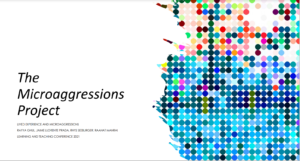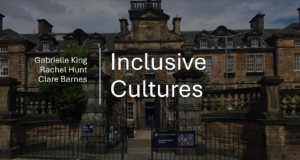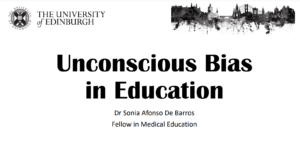Presented On: Wednesday 16 June: 12:00 – 13:00
This session contains the following 30 minute Paper Presentation and 15 minute Short Talks
- The Microaggressions Project (30 minutes)
- Inclusive cultures and Higher Education (15 minutes)
- Unconscious bias in education (15 minutes)
Click here for full screen
This video is equipped with automatically generated captions.
The Microaggressions Project
Presenter: Rayya Ghul, Rhys Seeburger, Raahat Manrai, Jaime Llorente Prada
Session Description
Microaggressions are “Everyday verbal, non-verbal and environmental slights, snubs or insults, whether intentional or unintentional, which communicate hostile, derogatory or negative message to target persons based solely upon their marginalized group membership” (Sue et al 2019). They are the everyday way in which our students experience racism, homophobia, transphobia and classism from their peers and teachers. We know that students thrive when they feel included and experience belonging so we need to seek ways to reduce impediments to this. It is also our stated duty to foster good relationships between staff and students and the university’s Dignity and Respect Policy, section 3.1 outlines the responsibility of staff and students to “Identify and challenge unacceptable behaviour when it occurs, even if it is not directed at ourselves.” In 2020 a project to develop resources to help staff recognise and counteract microaggressions produced four resources focusing on: race, sexuality, trans and/or non-binary and class. These were co-produced with students. The resources provided a unique insight into the lived experience of our students with these protected characteristics as well as practical suggestions for counteracting microaggressions in the classroom and curriculum. The paper will provide a brief outline of the methodology and feature reflective presentations on the experience of co-production from students from all four groups.
Inclusive cultures and Higher Education
Presenter: Gabrielle King, Rachel Hunt, Clare Barnes
Session Description
This talk outlines the initial analysis from the Principle’s Teaching Award Scheme project, Inclusive Cultures. By co-developing our research with students, we contribute a novel bottom-up approach to deepening our understanding of creating a more inclusive university culture where students from diverse backgrounds thrive and feel a sense of belonging. We view our education system as being tasked with addressing (and redressing) the consequences of disadvantage – the roots of which lie in wider social disadvantage and marginalisation. A key challenge for Universities is to engender in students transferable skills, while empowering them as lifelong critical and reflective learners (Harvey, 2000). With academic success dependent on inherited cultural capital and the propensity to invest in the educational system (Bourdieu, 1984), the need to focus of widening participation (WP) programmes is clear. Although these programmes help to increase access to HE, the challenges faced by disadvantaged students continue after entering HE (Howieson & Minty, 2019), and they often do not have access to the same ‘high impact practices’ as their peers (Speirs, et al., 2017). Working to lessen this imbalance, our project seeks to contribute to two of the supportive strands of the University WP Strategy; ‘support to succeed’ and ‘support to progress’. We believe that meaningful change will require a cultural shift rather than activities which single out WP students. Our first stage was to explore the extent of the inclusive institutional culture present in the School of GeoSciences today through a questionnaire, focus groups and interviews. We will use the findings to plan, implement and test a set of key interventions from Autumn 2021 onwards. We share them now in the hope of spurring future conversations with University-wide colleagues about similar work so that we can learn from each other.
Unconscious Bias in Education
Presenter: Sonia Afonso De Barros
Session Description
Believe it or not we all have unconscious bias which can be as frequent as explicit bias. When these are directed towards others they can have long lasting consequences. More so in the context of education.
Unconscious bias is a normal evolutionary process. It helps the human brain on decision making. It is not just negative but it can also have positive outcomes. All this without us even realising. However, the impact that it can have in all aspects of education, from recruitment, to teaching and learning, to promotion, to overall success, urges each and every one of us educators and students alike to acknowledge it and address it.
The ultimate goal of this session is to increase awareness on a topic that it not only relevant but crucial within teaching and learning. Unconscious bias can affect the very core of the teaching organizations and be an impediment to create a truly diverse and inclusive environment.
The question is: if it is unconscious then how do we address it? The purpose of the talk is to discuss ways of addressing Unconscious Bias in Education from a personal, institutional and curricular level. I will be providing an evolutionary review of the reasons for the existence of Unconscious Bias. Showcase some of the research around the topic. Discuss the pitfalls of Unconscious Bias within education and suggest strategies to move forward.
I hope to demonstrate how instrumental raising Unconscious Bias awareness is in activating and sustaining change in the discourse used in teaching and learning, addressing curriculum absence, reviewing policy making and challenging policy makers. Making the universities’ physical and conceptual spaces safe for all, irrespective of background, appearance, age, ability, accent…



